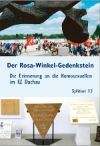Albert Knoll: presentation of Der Rosa-Winkel-Gedenkstein and the awarding of the André Delpech Prize
Albert Knoll: presentation of Der Rosa-Winkel-Gedenkstein and the awarding of the André Delpech Prize

Albert
Knoll began his book presentation by outlining the history of paragraph 175,
which since coming into force in 1872 made sexual acts between men a punishable
offence and was then tightened considerably in its application during the Nazi
era. Drawing on biographies from prisoners in the Dachau concentration camp,
Albert Knoll showed the grave consequences this had for homosexuals. He cited
the example of Leopold Obermeier, who was imprisoned in Dachau in 1935 as a Jew
and homosexual. The long years of struggle to have a commemorative plaque
erected for homosexuals as a victim group was touched on only briefly. Along
with other themes mentioned in his lecture, this issue is dealt with in greater
detail in the book itself.

On
March 18, 2016 Albert Knoll received the André Delpech Prize, awarded by the
Comité International de Dachau since 2013 for outstanding services rendered to
the remembrance of the Dachau concentration camp. At the award ceremony
Jean-Michel Thomas, President of the CID, highlighted that for many years now
Albert Knoll has tirelessly supported families in researching the fate of their
relatives, displaying kindness and sensibility. He also paid tribute to Knoll’s
enormous contribution to the ‘death book’: “Your work has become a reliable
source of information on the more than 220,000 prisoners who arrived in Dachau
over 13 years, as well as the alleged reasons for the Nazi persecution they had
to endure.”
